Over the last several decades, formal forensic debate has led a somewhat checkered history at Williston. Last year a new Political Awareness Club presented several well-attended and well-argued, if informal, debates. And in 2013 members of the AP U.S. History class went all the way to the national We The People finals in Washington. So debate is currently alive and in reasonable health. But it doesn’t compare with what was arguably a golden age of debating, for roughly sixty years beginning around 1860.
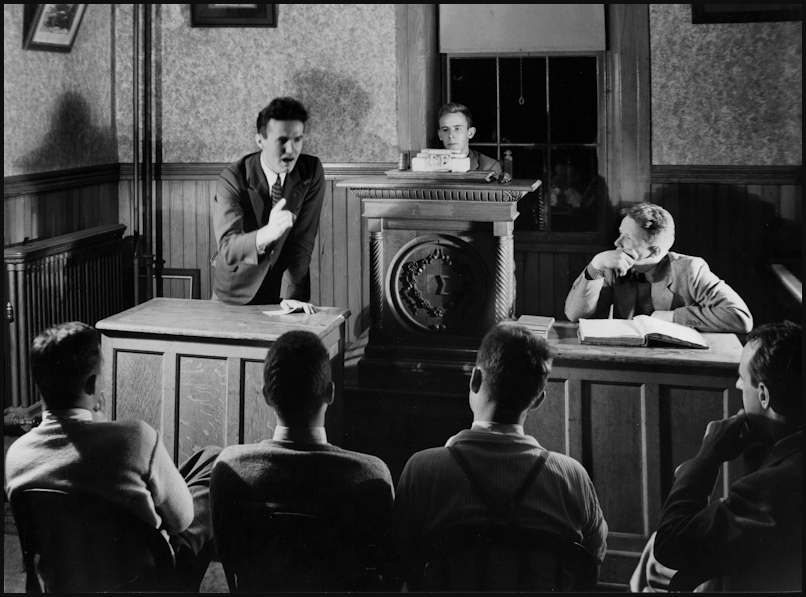
There were two rival societies: Adelphi (“Brotherhood”), representing students from the Classical side of the curriculum; and Gamma Sigma (from the Greek initials for Socrates’ admonition to “Know Thyself”), drawing its membership from students in the Scientific program. The elder society, Adelphi, was founded in 1853, and was initially open to all students. But the growth of the Scientific program produced friction. The Classicals arrogated to themselves a tradition that as members of the intellectually superior division of the Seminary, all positions of leadership within Adelphi should devolve to them. Naturally the Scientifics objected. Unable either to achieve compromise or extract an appropriate apology, in 1870 they withdrew from Adelphi and founded their own organization. The rivalry continued unabated for decades, long after the initial slight was forgotten.
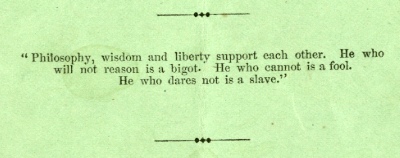
In March, 1881, an attempt at reconciliation resulted in the creation of the campus newspaper, The Willistonian, to be “published by the Societies of Williston Seminary.” Good feeling and cooperation lasted for exactly one issue, after which Adelphi published The Willistonian on its own. (The newspaper became independent of either society in 1894.)
Both Adelphi and Gamma Sigma were essential elements in campus culture. Each society held frequent, sometimes weekly debates, which were open to the public and often drew substantial audiences from the town. A typical program included not only debate, but an oration, readings, and music. Both organizations also published magazines — Adelphi’s Oracle and Gamma Sigma’s Mirror — offered banquets and entertainments to their members, and maintained well-stocked reading rooms long before it occurred to the administration that the Seminary ought to have a library.
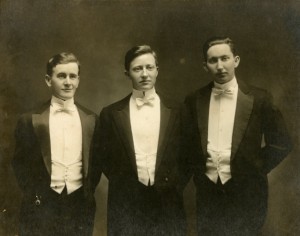
In 1886 the F. C. Fraternity sponsored the first of a long tradition of joint debates, for which they donated a cup. With tongue only partially in cheek, the resolution for the evening concerned the superiority of a Scientific education over Classical. These annual contests became so popular that the organizers used the Town Hall or Payson Church to accommodate large crowds. Participants typically wore formal dress, while The Willistonian covered the event with the passionate detail usually afforded only to football games. Often faculty and community leaders were invited to be judges.
A sampling of debate topics shows considerable breadth of interest. Occasionally a resolution might appear sophomoric, and the students, then as now, often phrased resolutions with unnecessary complexity — demanding, for example, that the affirmative side argue a negative, as in the first three examples below. In the aggregate, the resolutions represent a cross-section of the hot issues of the day.
Resolved, “That the name of John Brown is unworthy of respect.” (Adelphi, March 9, 1860)
“That the course of the United States, in the War with Mexico, was unjustifiable.” (Adelphi, July 20, 1860)
“That the odium cast upon the name of Aaron Burr is unjustifiable.” (Adelphi, July 19, 1861)
“That slavery has effected more injury to our country, than the ambition of the people to gain posts of influence and honor.” (Adelphi, November 8, 1861)
“That the Government should consider the Seceded States as Territories.” (Adelphi, July 18, 1862)
“That the present war will be beneficial to the whole country.” (Adelphi, June 24, 1863)
“That contending political parties are beneficial to a Government.” (Adelphi, June 22, 1864)
“That the right of suffrage ought to be secured to the liberated slaves, immediately, upon the re-admission of the rebellious States.” (Adelphi, June 21, 1865.)
“That San Domingo ought to be annexed to the United States.” (Adelphi, March 1, 1871)
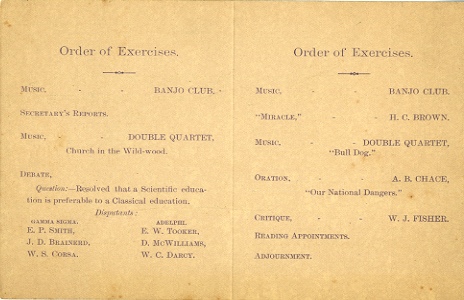
“That a Scientific education is preferable to a classical education.” (Joint debate, December 10, 1886)
“That Utah should become a state.” (Adelphi, December 2, 1887)
“That home rule should be granted to Ireland.” (Adelphi, May 18, 1888)
“That the annexation of Canada to the United States would be beneficial to both these countries.” (Adelphi, December 9, 1892)
“That the World’s Fair should be open on Sunday.” (Gamma Sigma, January 27, 1893.)
“That a tariff for revenue only, would be pernicious to the welfare of the United States.” (Adelphi, December 14, 1894)
“That Canada should be annexed to the United States.” (Gamma Sigma, February 1, 1895) [Apparently this topic wouldn’t go away quietly.]
“That Profit Sharing is for the best interests of Capital and Labor.” (Gamma Sigma, January 31, 1896)
“That Suffrage should not be granted to women.” (Joint debate, March 20, 1896)
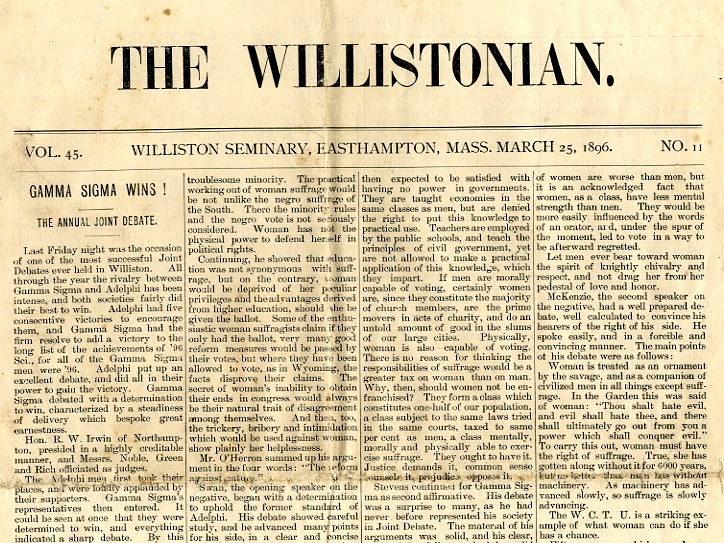
“That the Jury System should be abolished.” (Gamma Sigma, January 22, 1897)
“That the action of the United States government in excluding the Chinese is justifiable.” (Joint debate, March 26, 1897)
“That the Negro ought not to have been Enfranchised.” (Joint debate, March 19, 1898)
“That the United States should pursue the policy of expansion.” (Joint debate, March 17, 1899)
“That England is justified in her present action in the Transvaal.” (Joint debate, April 13, 1900)
“That the present License Law of Massachusetts should be superseded by a system which should secure to the public all the profits of the sale of alcoholic drinks above 5 per cent. on the capital invested and should then apply these profits to diminish the temptations to intemperance.” (Adelphi, December 13, 1901.)
“That Organized Labor has been a greater menace to the commonwealth than organized capital.” (Gamma Sigma, January 17, 1902)
“That the Chinese exclusion bill should be re-enacted.” (Joint debate, May 23, 1902)

“That the evils resulting from the working and influence of trusts and monopolies outweigh the benefits.” (Joint debate, June 5, 1903)
“That the interests of the world would be advanced more by the success of Japan than that of Russia in the present war.” (Adelphi, December 9, 1904)
“That it should be the policy of the United States not to hold territory permanently unless with the purpose that it shall ultimately enjoy statehood.” (Joint debate, March 17, 1905)
“That the recommendation of President Roosevelt in his speech of April 14, regarding the limitation of great fortunes, should be adopted.” (Adelphi, December 7, 1906)
“That employers should be liable for any injuries received by their employees arising from their employment.” (Adelphi, December 18, 1908)
“That the history of the trades unions for the past ten years, shows a tendency detrimental to the best interests of the people.” (Adelphi, January 26, 1912)
“That Capital Punishment should be abolished.” (Gamma Sigma, February 2, 1912)
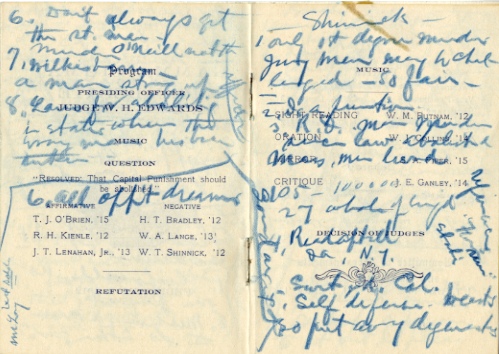
“That American coastwise ships should be charged toll for passage through the Panama Canal.” (Adelphi, February 14, 1913)
“That further restriction of European immigration is desirable.” (Joint debate, March 14, 1913)
“That the discrimination against land-owning of the Japanese in California is unjustifiable.” (Adelphi, December 13, 1914)
“That the Philippine Islands should be given absolute independence.” (Gamma Sigma, February 27, 1914)
“That there should be compulsory military training in all secondary schools of the United States.” (Joint debate, March 9, 1917)
“That at the close of the present war, the United States should lend its aid in the establishment of an international police court to enforce peace.” (Joint debate, March 15, 1918)
“That the League of Nations is the best preventative for future wars.” (Joint debate, March 14, 1919)
After the Great War, debate entered a period of gradual decline. Curricular reform had eliminated the divisions between Scientific and Classical, rendering the need for two dedicated societies irrelevant. Ultimately they merged, and enjoyed a reduced existence as Adelphi-Gamma Sigma into the 1960s. But the rise of other, less rigorous entertainments — movies, the radio, etc. — diluted interest in debate. Perhaps another golden age lies ahead of us.

